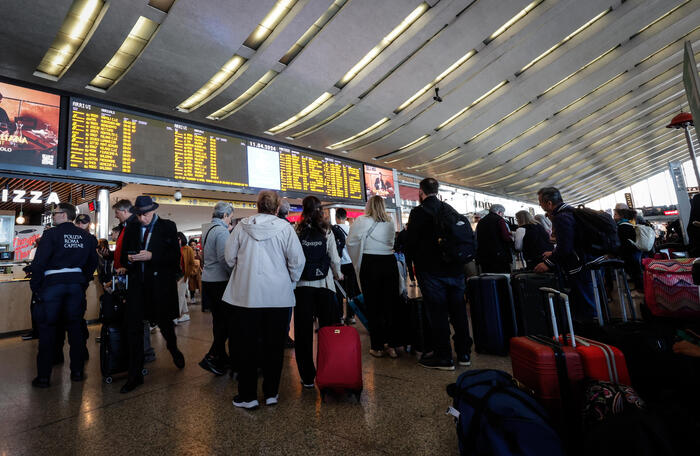Icon: enlarge
Seamstress in Bangladesh after the factories reopened after the corona shutdown
Photo: Fabeha Monir / DER SPIEGEL
For Sahida Begum, closing time usually meant walking home in the dark at 10 p.m.
But nothing has been normal since the pandemic.
Since this summer, just like the other textile workers, she has turned off her sewing machine punctually at 5 p.m. and left the factory.
What sounds like a regular working day to many is a nightmare for the 32-year-old, she says.
Begum sews zippers in trousers, among others for fashion brands such as Esprit and Zara.
For five years she has been working in one of the hundreds of factories in the industrial city of Tongi on the outskirts of Dhaka, a metropolis of millions and the capital of Bangladesh.
But she is not happy about the free time.
On the contrary: It was these additional five hours of overtime that enabled Begum to pay the rent of her one-room apartment, buy food for her ten-year-old twins and save a little.
"We're not getting enough orders at the moment," she says.
"We want to work. Above all, we have to earn money to survive."
Icon: enlarge
Sahida Begum
Photo: Fabeha Monir / DER SPIEGEL
Since May, after a lockdown of almost one and a half months, the around 4,000 textile factories in Bangladesh have been producing again.
40 percent of canceled orders have resumed, AK Abdul Momen, Bangladesh's foreign minister, said recently.
Many fashion companies had deferred their payments or canceled orders in the spring, a total of almost three billion euros.
Nevertheless, the pandemic and closed shops continue to have a massive impact on Europe's shopping streets.
According to a survey by the Center for Global Workers 'Rights at Penn State University in the United States, international brands are said to have depressed prices by more than 12 percent in various production countries, thereby "exploiting" the factories' desperation.
The order volume has increased again since September, but prices have fallen, said Iqbal Hamid Quraishi, factory owner and one of the directors of the powerful textile association BGMEA, to the Thomson Reuters Foundation.
"There's little room to negotiate with brands. They tell us they'll turn to other suppliers if we're not happy with the price."
Those who suffer the most are at the bottom of the supply chain.
Tens of thousands of workers lost their jobs, according to the union.
In a recent survey by Brac University Dhaka and the University of California Berkeley, three quarters of the more than 1,000 respondents said they earned less than before;
another three quarters said they would give up fish and meat in order to save money.
Others have to fall back on their savings to survive.
The corona pandemic reveals what scientists and activists have been saying for years: seamstresses like Sahida Begum can only live on their wages by working overtime.
The government had already doubled the minimum wage two years ago, to 8,000 taka a month, the equivalent of 79 euros.
"But even this minimum wage is neither enough to eat a balanced diet, nor to set something aside for retirement," says Khondaker Golam Moazzem, scientific director of the Think Tanks Center for Policy Dialogue in Dhaka.
Icon: enlarge
Seamstress in Dhaka, Bangladesh (archive image)
Photo: Mehedi Hasan / ZUMA Press / imago images
Sahida Begum is an experienced seamstress who got through the crisis comparatively well.
As planned by the government, she received 60 percent of her wages during the lockdown between late March and early May.
"But we live in constant fear of losing our job," she says.
Their children's school is closed, the twin girls are at home with their husband, who has lost his job as an electrician in a factory.
Begum currently receives her basic salary of 10,200 taka, just under 103 euros a month.
Before the crisis, she earned at least fifty euros more by working overtime.
40 euros rent for a one-room apartment for the whole family
Therefore, she can currently neither pay private tuition for her girls, who are not allowed to go to school, nor can she continue to save for the house that she and her husband wanted to build for the pension in her home district Kishoreganj.
Her money is just enough to rent the one-room apartment of 40 euros and for groceries, whereby she also saves on food for herself.
While Development Minister Gerd Müller (CSU) and Labor Minister Hubertus Heil (SPD) are trying to pass the supply chain law in this legislative period, in Bangladesh it is currently less about possible legal proceedings and less about trade union rights, but for most workers simply: an appropriate one Wage.
Begum has never heard of the law.
But she thinks it's a good idea in principle.
"This will help both the owner and us," she says.
Bangladesh is the world's largest producer of textiles after China.
The branch of industry accounts for almost eleven percent of the gross domestic product.
But with the pandemic, not only did the global supply chain collapse, but also an implicit trade promise that connects the West with this country: cheap clothes for jobs and economic advancement.
In fact, the expansion of the textile industry in Bangladesh over the past forty years has resulted in a certain degree of prosperity.
Since 1980 the average age has risen by twenty years to over seventy, women have an average of almost two and no longer six children.
The number of people living below the poverty line has fallen by two thirds from 44 percent since 1991.
Time and again, analysts and journalists write about the never-ending rise of Bangladesh.
Icon: enlarge
Zairen Akter
Photo: Fabeha Monir / DER SPIEGEL
Zairen Akter's wages have also risen over the years.
When she started sewing in 2002 - when she was 14 years old at the time - she was earning 930 taka per month, or just under 9.40 euros, in the factory in Tongi.
Almost 20 years later, before the pandemic, the 32-year-old who worked overtime got fifteen times as much, around 150 euros.
Now, like Begum, she lacks the additional fifty euros.
To save rent, Zairen Akter lives just under 30 minutes from the factory.
Rents near the factories are often disproportionately high;
Landlords and businesses take advantage of the fact that workers have to live close to their workplace because there is no fast bus network.
For the room, Akter pays the equivalent of 27 euros, a quarter of her current income.
She shares the two toilets and a kitchen with 25 neighbors - another reason why Akter fears that he can easily catch the corona virus.
"If anyone has it, we all have it."
Icon: enlarge
Seamstresses in Dhaka, Bangladesh (archive image): "You can't keep your distance"
Photo: Mehedi Hasan / ZUMA Press / imago images
In total, more than 407,000 people have been infected with Covid-19 in Bangladesh, and more than 5,900 have died from it.
Akter is supposed to wash his hands in the factory every twenty minutes and always wear a mask, she says, there is soap and enough toilets.
But the sewing machines are close together.
"You can't keep your distance," she says.
Above all, however, she fears a new lockdown in Europe.
This could again lead to brands canceling their orders or even having to close their factories in Bangladesh.
In the meantime, she says she'll just keep going to work and hope not to get Covid-19.
Because she really couldn't afford that.
Icon: The mirror
This contribution is part of the Global Society project
What is the Global Society project? Up arrow Down arrow
Under the heading Global Society, reporters from
Asia, Africa, Latin America and Europe
report on injustices in a globalized world, socio-political challenges and sustainable development.
The reports, analyzes, photo series, videos and podcasts appear in the international section of SPIEGEL.
The project is long-term and will be supported by the Bill & Melinda Gates Foundation (BMGF) for three years.
A detailed FAQ with questions and answers about the project can be found here.
What does the funding look like in concrete terms? Up arrow Down arrow
The Bill & Melinda Gates Foundation (BMGF) is supporting the project for three years with a total of around 2.3 million euros.
Is the journalistic content independent of the foundation? Up arrow Down arrow
Yes.
The editorial content is created without any influence from the Gates Foundation.
Do other media have similar projects? Up arrow Down arrow
Yes.
Big European media like "The Guardian" and "El País" have set up similar sections on their news sites with "Global Development" and "Planeta Futuro" with the support of the Gates Foundation.
Have there already been similar projects at SPIEGEL? Up arrow Down arrow
In recent years, SPIEGEL has already implemented two projects with the European Journalism Center (EJC) and the support of the Bill & Melinda Gates Foundation: The "Expedition The Day After Tomorrow" on global sustainability goals and the journalistic refugee project "The New Arrivals", as part of this several award-winning multimedia reports on the topics of migration and flight have been produced.
Where can I find all publications on Global Society? Up arrow Down arrow
The pieces can be found at SPIEGEL on the topic Global Society.









